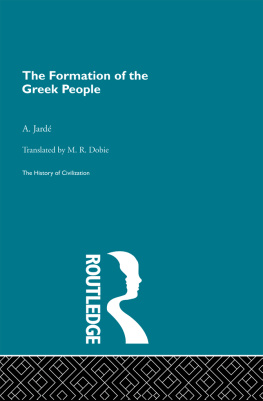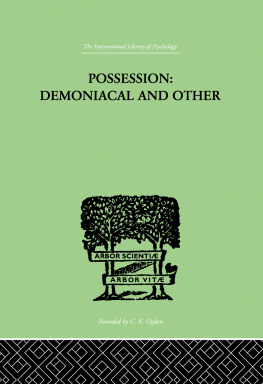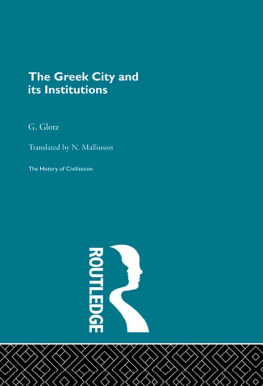THE HISTORY OF CIVILIZATION
General Editor C. K. Ogden
The History of Civilization is a landmark in early twentieth Century publishing. The aim of the general editor, C. K. Ogden, was to "summarise in one comprehensive synthesis the most recent findings and theories of historians, anthropologists, archaeologists, sociologists and all conscientious students of civilization." The History, which includes titles in the French series L'Evolution de l'Humanit, was published at a formative time in the development of the social sciences, and during a period of significant historical discoveries.
A list of the titles in the series can be found at the end of this book.
First published in 1926 by Routledge, Trench, Trubner
Reprinted in 1996,1998 by Routledge
2 Park Square, Milton Park,
Abingdon, Oxon, 0X14 4RN
&
270 Madison Ave,
New York NY 10016
Transferred to Digital Printing 2008
1996 Routledge
All rights reserved. No part of this book may be reprinted or
utilized in any form or by any means electronic, mechanical,
or other means, now known or hereafter invented, including
photocopying and recording, in any information storage
or retrieval system, without permission in writing
from the publishers.
British Cataloguing in Publication Data
ISBN: 0-415-15575-4
ISBN: 978-1-1361-9593-8 (ePub)
ISBN Greek Civilization (7 volume set): 0-415-15612-2
ISBN History of Civilization (50 volume set): 0-415-14380-2
Publisher's Note
The publisher has gone to great lengths to ensure the quality of
this reprint but points out that some imperfections in the
original may be apparent
TO
MY MASTERS AND FRIENDS
THOPHILE HOMOLLE AND MAURICE HOLLEAUX
SOMETIME DIRECTORS
OF THE FRENCH SCHOOL AT ATHENS
THE GREEK "MIRACLE"
THE Greek miracle ? Since the day when it came from Renan's pen, this striking phrase has been incessantly repeated and often discussed. Only those reject it who fear thatmiracle" may be understood in the sense which Christian mysticism gives to the word. The miracle, in the mystic sense, is that which occurs, not without a causenothing is born of nothingbut without a cause of a natural order, which escapes determinism. It is obvious that if we had to understand byGreek miracle" the irrational appearance of an historical phenomenon of first magnitudeHellenic civilizationif by using this word we had to revive the kind of historical interpretation of which St. Augustine has given a model in his City of God and Bossuet in his Discours sur l'Histoire universelle, it would be necessary to reject an expression so compromising for science.
But the word is perfectly legitimate if we maintain its proper, etymological meaning of an object worthy of admiration. It even implies something morethe unexpected, the surprising. Themiracle," no doubt, should not be interpreted according to a providentialist philosophy of history ; but it equally excludes a rigidly logical philosophy of history in the manner of the German idealists. Miracle implies contingency. An aggregate of favourable contingencies, an exceptional concurrence of happy circumstances, supplies the logic in the case of amiraculous" peopleas in the case of agenius" or amasterpiece." First we assert the miracle ; then we may seek to explain it.
The Greekmiracle" cannot be denied. All who have known Greece have prayed, in their own fashion, on the Acropolis. All who have studied her works have proclaimed the debt of mankind.There was once, on the globe, a little corner of
Nowhere, in antiquity, had the individual man a greater value, nowhere was the organization of social life, by the action of the law itself, more favourable to the full development of the individual.In Athens," Thucydides said,a man is esteemed, with regard to the common good, less by his rank than by his personal worth" It was there that democracy was born; we cannot deny to Athens the merit of having made the experiment the first,of having, as it were, illustrated some of its best aspects, and of having thereby given to the future a useful example, a fruitful lesson."
Greece created humanity and liberty, and beyond all others she created beauty and wisdom.
Elsewhere art had been chiefly realistic, impressionist ; here the poet and the artist played in an ideal world of images.Rich in varied elements, the religion of the Greeks has above all the distinctive feature of having been handled, penetrated, transformed by poetic imagination. It could mingle the more intimately in all the activities of man, and, instead of weighing him down, could favour the development o f all his faculties. In becoming thus human, religion humanized nature ; it gradually brought into it a notion of law, born of social life, which reinforced the intuition of law, born of practical life, of adaptation to phenomena.
Among the peoples whose ancient civilizations have been studied in the earlier volumes of this series, the minds of men,essentially utilitarian," continued, in the same direction, the mental progress which we have seen taking place in the course of animal evolution and attaining remarkable results in the Anthropoid. All these hard-working men, farmers, founders, architects, sculptors, accomplish material work, which remains bound up with the sod which they turn over, with the bronze which they hammer and cut, with the clay which they mould and glaze, with the syenite and the jade which they polish like mirrors. As against these mechanicals, the Aryan races think, or at least they think more ; they have a singular aptitude for combining representations"
No doubt the play of ideas has its dangers. The thought which indulges in it may, just like the imagination when excited, stray, far or a little, from the positive data furnished by representation and applied in technical processes.
This prodigious development of individuality and thought is all the more interesting because it led to new problemsand problems with which man has been faced ever since. Reflection has its advantages, and it has its drawbacks. To reflect on life is to perceive all its miseries, its uglinesses, and its contradictions ; thereby the vital impulse is broken or slowed down.On the other hand, reflection may remove the harmful or disputable elements brought into human life by the spontaneous action of various forces, by collective and individual appetites. The evolution of humanity is civilization developing, and civilization criticizing itself. More reflection can cure the evils which reflection brings.
In devoting so many volumes of this section to Greece, we believe that we are only giving her what is her due.
The first and last volumes give an outline of the great historical framework. They analyse the various contingencies of place, race, and individuals, and bring out the circumstances of every kind which contributed to the organization of the Greek cities, created Hellenic civilization, and then caused it to radiate far and wide.
















